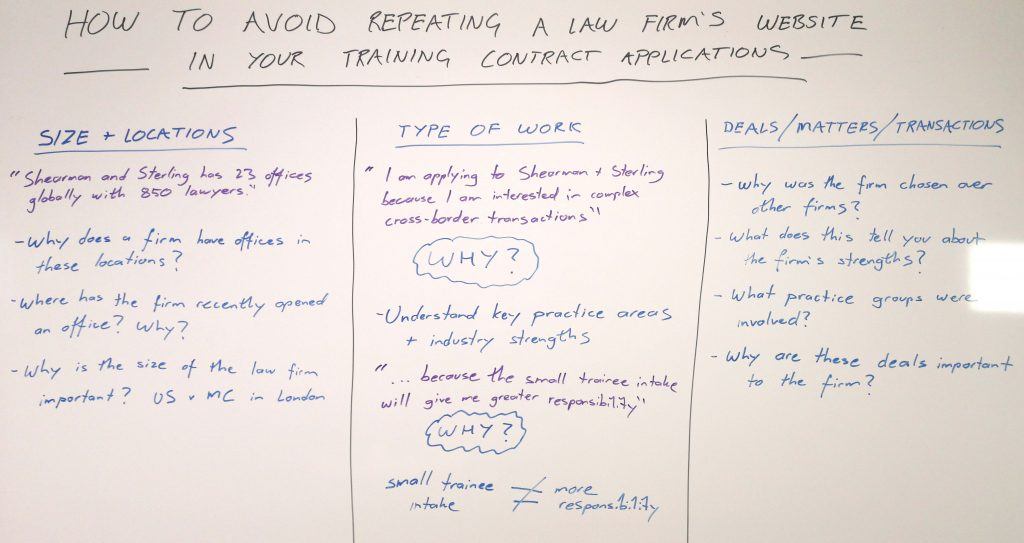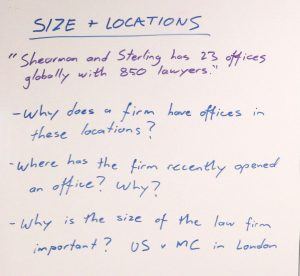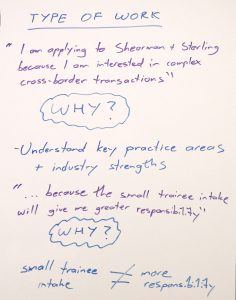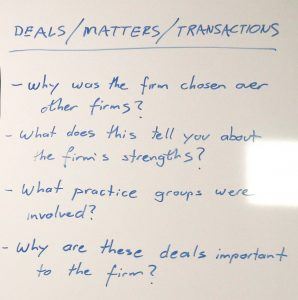Information hub
All the latest views and news here
How to Avoid Repeating a Law Firm’s Website in your Training Contract Applications – Whiteboard Wednesday
TRANSCRIPT

Hello, and welcome to Whiteboard Wednesday. Today, I’m going to be giving you some tips on how to avoid repeating a law firm’s website in your training contracts applications.
Okay, so when I see training contract applications, what I often find is that candidates repeat a lot of the information back that they’ve read on websites.
That’s not really that helpful.
So I’m going to give you some tips today on how you can look at some of the information that’s on a website, and be able to analyze and research it a little bit better so that your answers are more relevant to the law firm that you’re applying to.
Size and Location

Let’s start off with the first element that I often see candidates repeating back – and it’s really to do with the size of a law firm and the locations of the office.
Candidates will often write something like, “Shearman & Sterling has 23 offices globally and 850 lawyers.” A statement like that in itself is not very helpful – and I’d advise you to stay away from making statements like that, because it’s not research. It only takes a second glance at the website to know that. So what you should really be doing is to look at the size of the office, and the number of lawyers, and the locations, and begin to ask questions like “why does a law firm have offices in these locations?”
Think about where the law firm has recently opened offices and try and think about why that would be.
If you think historically, a firm like Shearman, we expanded out of New York to Paris, London, Abu Dhabi, many years ago. Think about why that happened.
Recently, we’ve opened offices in Texas and Seoul, and again, think why. Don’t just state that we have offices in those locations.
When it comes to the size of the office – so the number of lawyers, think why is that important. Now, law firms are made up of many different types, many different sizes. So if you’re applying to a US firm in London – US firms might have 100 lawyers or 200 lawyers. How does that match up against Magic Circle firms in London that might have thousands of lawyers?
What does the size enable the law firm to do? And vice versa. What does the size of a Magic Circle law firm enable the firm to do that a US firm can’t do? So try and think about it in that way, rather than just making a statement like this.
Type of Work

The second part of an application that I find candidates really repeat rather than analyze is the type of work.
So I might see a statement like this: “I’ve applied to Shearman & Sterling because I’m interested in complex cross-border transactions.” And again, it doesn’t really tell us anything. That’s the type of work that we do, so it wouldn’t make sense if you weren’t interested in that. You might as well say, “I’m interested in becoming a commercial lawyer because I enjoy law.” It’s really just one step away from a statement like that.
The key thing is to ask why.
Why are you interested in cross-border complex transactions? That’s often what’s missing on an application form. There’s no real analysis, no explanation as to why. So try and think about key practice areas and key industry strengths for a particular law firm. So rather than say ‘complex cross-border transactions’, I think it’s better to think about it in terms of the practice areas and the industry strengths, and what that allows the law firm to do.
The second thing that I find that candidates repeat back is around the size of the trainee intake. So an example answer might be, “I’m interested in Shearman & Sterling because the small trainee intake will give me greater responsibility.”
Okay, but why?
That’s the part that’s missing. Why do you want greater responsibility? And also, just because you have a smaller trainee intake, it doesn’t necessarily mean you get more responsibility.
There’s something about the law firm, the way it’s structured, the way it operates, the responsibility that it gives to trainees, that allows more responsibility. So, a small trainee intake doesn’t necessarily equal more responsibility. So a statement like that, again, doesn’t really tell me that much. It’s very superficial. Try and break it down and explain why.
That’s often the missing part.
Deals, Matters, Transactions

The other thing that candidates talk about is deals, transactions or matters that a law firm has worked on – or big deals in the past. And that makes sense, but again, there’s not a great deal of analysis that goes on.
So try and think of things like why was the law firm chosen over other law firms? That’s going to be a critical question to ask.
Of all the hundreds of law firms, why was the particular law firm that you’re applying to chosen to work on a particular deal or transaction as opposed to all the other law firms?
That will give you some idea of what the law firm’s strengths are, and that links back to this point here – practice areas and industry strengths. So these two things are actually linked.
Try and think as well about the practice groups that would have been involved in a particular deal or a transaction.
So don’t just state that a transaction happened. Try and break it down and think about who might have been involved. Also think about why these deals are important to the firm.
If you go to a law firm Open Day, or a campus presentation, there will always be a deal list [shown] – and the law firm will have chosen those deals for a particular reason – because they’ll be important.
People are very passionate about the deals that they’ve worked on. If a law firm is talking about a particular deal quite often, think about why it’s important to the law firm. Do a bit more analysis on it.
I’d say those are the three areas that I find candidates repeat information back rather than analyze – the size and the locations of the office, the type of work or the nature of the work that the law firm does, and then the deals, matters, transactions.
Don’t just state things – try and analyze it a little bit more. Hopefully this will give you some tips, and I’m sure your applications will improve if you think about these things a little bit more and express them more clearly in your applications.
So good luck. I hope you’ve enjoyed Whiteboard Wednesday. If you’ve got any comments, just type them below. And we’ll see you next time.
Thank you.


